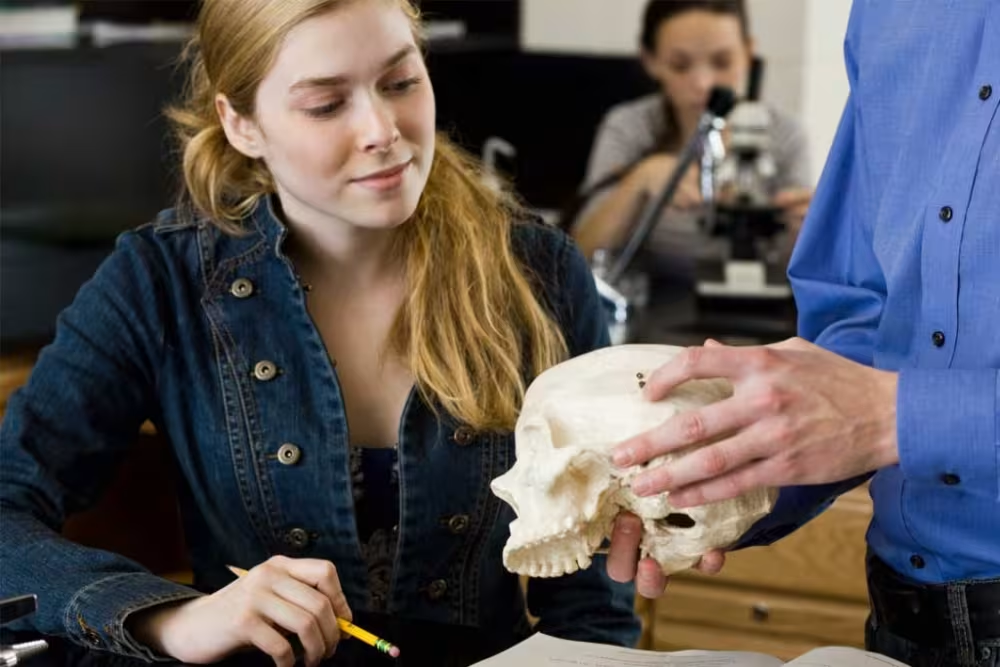Nursing School Requirements and Prerequisites: What You Need to Know
Each blog post is dated and contains accurate information as of that date. Certain information may have changed since the blog post publication date. If you would like to confirm the current accuracy of blog information, please visit our ABSN program overview page or contact us at 866-890-9467.
Meeting nursing school requirements is one of the first steps toward applying to an Accelerated BSN program. It’s common for ABSN programs to require a completed non-nursing bachelor’s degree with a minimum cumulative GPA. In addition, you’ll need to take nursing school prerequisite courses to prepare for the nursing curriculum.

If you’ve decided to enroll in a nursing program, you’ve probably been researching nursing school requirements. Every university establishes its own requirements, but there are some common ones. Here at Xavier University, our 16-month Accelerated Bachelor of Science in Nursing (ABSN) program has minimal requirements, including either a completed non-nursing bachelor’s degree and four prerequisite courses or completing the undergraduate requirements. These requirements benefit prospective nursing students who want to start their degree quickly.
Review the BSN requirements before applying to Xavier’s ABSN program and consider your academic background. Examine the course descriptions for the four nursing school prerequisites and follow best practices for meeting all the requirements. Your dedicated admissions adviser can assist you through each step of the process and help navigate any obstacles.
Understanding the Basic Requirements for Nursing School
Considering all the eligibility requirements and prerequisites, getting into nursing school can seem overwhelming. Those requirements for nursing school are in place to prepare our students to succeed in our program.
Because of the accelerated nature of our ABSN program, our curriculum is fast-paced and intensive, covering complex topics. Meeting the eligibility requirements shows the admissions team that you can complete advanced coursework and do well in the program.
Additionally, prerequisite courses ensure that everyone enters the program with the same understanding of some basic scientific and mathematical principles that we will build on in subsequent courses. Even if you have no previous experience in the sciences or healthcare, the prerequisites will prepare you for the challenges of nursing school.

Common Nursing School Prerequisite Courses
Most ABSN programs have a lengthy list of prerequisites, which means it can take quite a while to be eligible to apply. In contrast, Xavier only requires four prerequisites for nursing, so you can apply sooner. Despite the limited number of ABSN prerequisites, these courses are challenging and critical for nursing career preparedness. They are as follows if you already have an undergraduate degree in an area other than nursing:
- Microbiology
- Human Anatomy or Anatomy & Physiology I (with lab)
- Human Physiology or Anatomy & Physiology II (with lab)
- Statistics
Try these successful strategies for taking notes in nursing school.

Microbiology in Nursing
Microbiology is an essential branch of science that studies microbes and how these tiny, living things influence our lives.
Nurses need a deep understanding of microbiology because they use their knowledge of microbes in various ways, from properly disposing of biomedical waste to understanding laboratory reports. They also rely on their knowledge of microbiology to evaluate how a patient responds to treatment. A solid understanding of microbiology can also support best practices in the medical field, such as ensuring the correct antibiotics are given, performing sterile procedures, collecting swabs and providing safe care.
Anatomy and Physiology in Nursing
While anatomy studies the structures associated with the human body, physiology is how these structures function. In short, they work hand-in-hand. Exploring the human body in its balanced state, anatomy and physiology are the cornerstones for nearly every healthcare profession. By understanding how the body works, we can identify and treat disease.
Nurses rely on anatomy and physiology to determine the best action when caring for a specific patient. By understanding the complexities of how all systems within the human body work together to function properly, you’ll be well-suited to identify when they aren’t functioning correctly and how that affects your patient.

Statistics in Nursing
Statistics is the science of learning from data. It includes finding ways to organize, summarize and describe quantifiable data and creating methods for drawing conclusions and generalizing upon them.
When it comes to nursing, RNs use statistics routinely, from studying disease patterns in patients to determining the time interval for when a patient should take prescribed medicine. Nurses use statistics when they review research related to patient care, outcomes, and evidence-based practice to determine if data is valid and reliable. Nurses also use statistics to calculate the average number of patient examinations per day, week, month or year, which allows them to predict when health consultation is at its peak.

What is nursing school like? Discover what you can expect from life as a nursing student.
ABSN Requirements: What You Need to Enter an Accelerated Nursing Program
While every nursing school has different ABSN admission requirements, students applying to any program must meet specific academic criteria. After all, ABSN programs are for individuals with either a non-nursing undergraduate education or who have completed all the required undergraduate work for nursing.
The eligibility requirements for our ABSN program are:
- A non-nursing bachelor’s degree from an accredited institution or enrollment in our adult studies program to complete the required undergraduate work.
- A minimum cumulative undergraduate GPA of 2.7
- A minimum cumulative GPA of 3.0 for all prerequisites
- A minimum grade of C for each prerequisite course
All nursing prerequisites must have been completed within eight years of your ABSN program start date.
Many of our ABSN students are career-changers. Our cohort members typically have varying experiences, worldviews and ages. Exposure to this level of diversity can add to your educational experience and help you become a more well-rounded nurse, as you’ll better understand how your patients’ past experiences have shaped who they are.

Tips for Meeting Nursing School Requirements Efficiently
The most impactful tip for meeting the requirements is connecting with an Xavier admissions adviser. Even if you’re unsure whether you might qualify to apply to our ABSN program, reach out to an adviser for personalized assistance. Have a copy of your unofficial transcripts so your adviser can review your academic background.
Even if you didn’t quite finish your non-nursing bachelor’s degree, you may still be able to apply to nursing school. You’ll need to plan for completing the required coursework, and then you can work on fulfilling the rest of the nursing school requirements.
When you’re ready to fulfill the nursing school prerequisites, the most efficient way is to take those courses through Xavier. When you take prerequisites at Xavier, you may qualify for provisional admission into the ABSN program. It’s a more convenient and accessible way to prepare for nursing school. In addition, taking the prerequisites online at Xavier will familiarize you with our e-learning platform. You’ll know how to navigate it and use the various features when ready to start your nursing coursework.
Get in Touch With Our Admission Team Today
Xavier University invites you to take the next step in your career and transition to nursing with our ABSN program. Our intensive curriculum combines extensive student support services, including Academic Success Coaches, dedicated nursing instructors and NCLEX prep resources. With two locations in Ohio and three start dates each year, a nursing education is within reach.
Contact our admissions advisers today to learn how you can meet our nursing school requirements.
